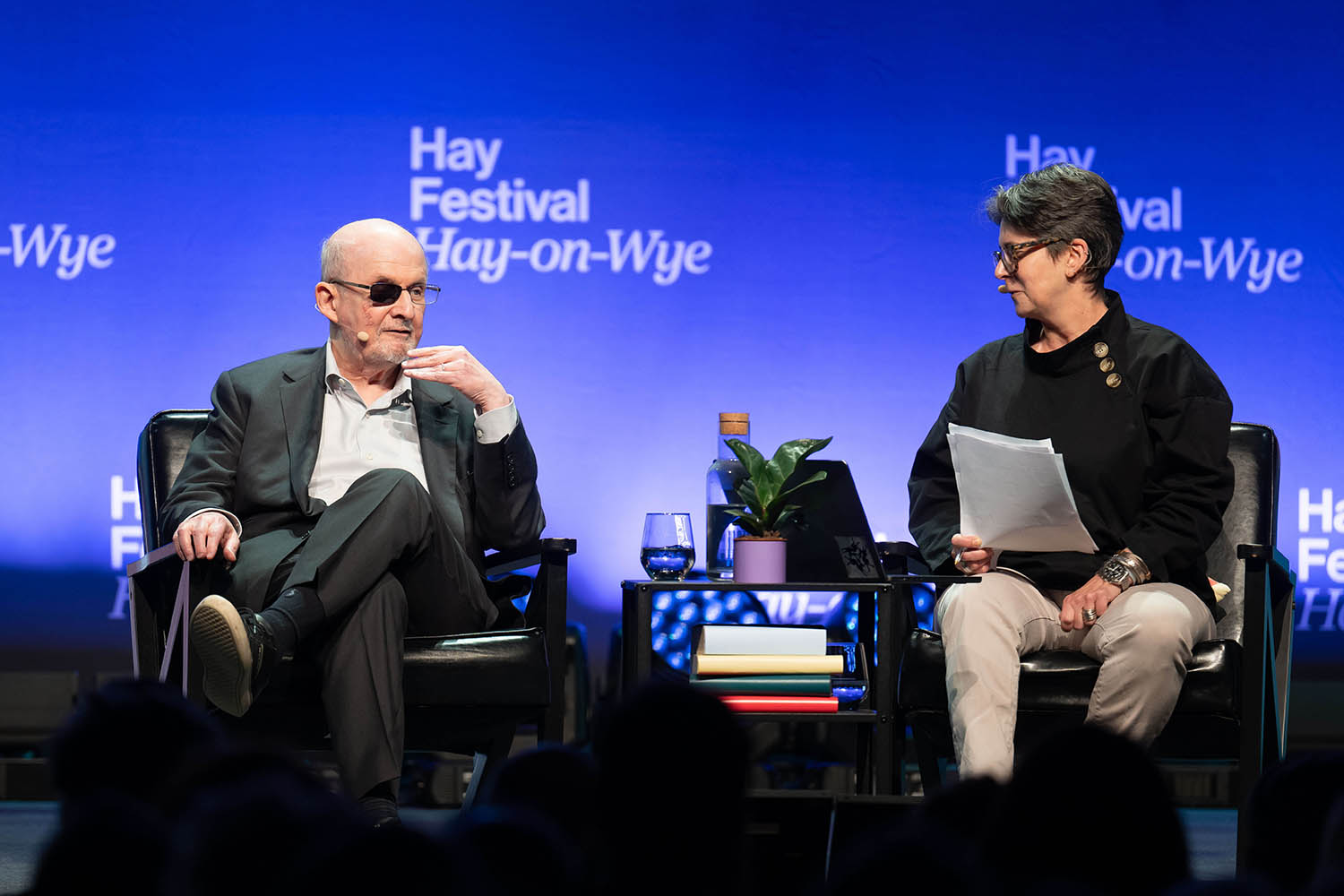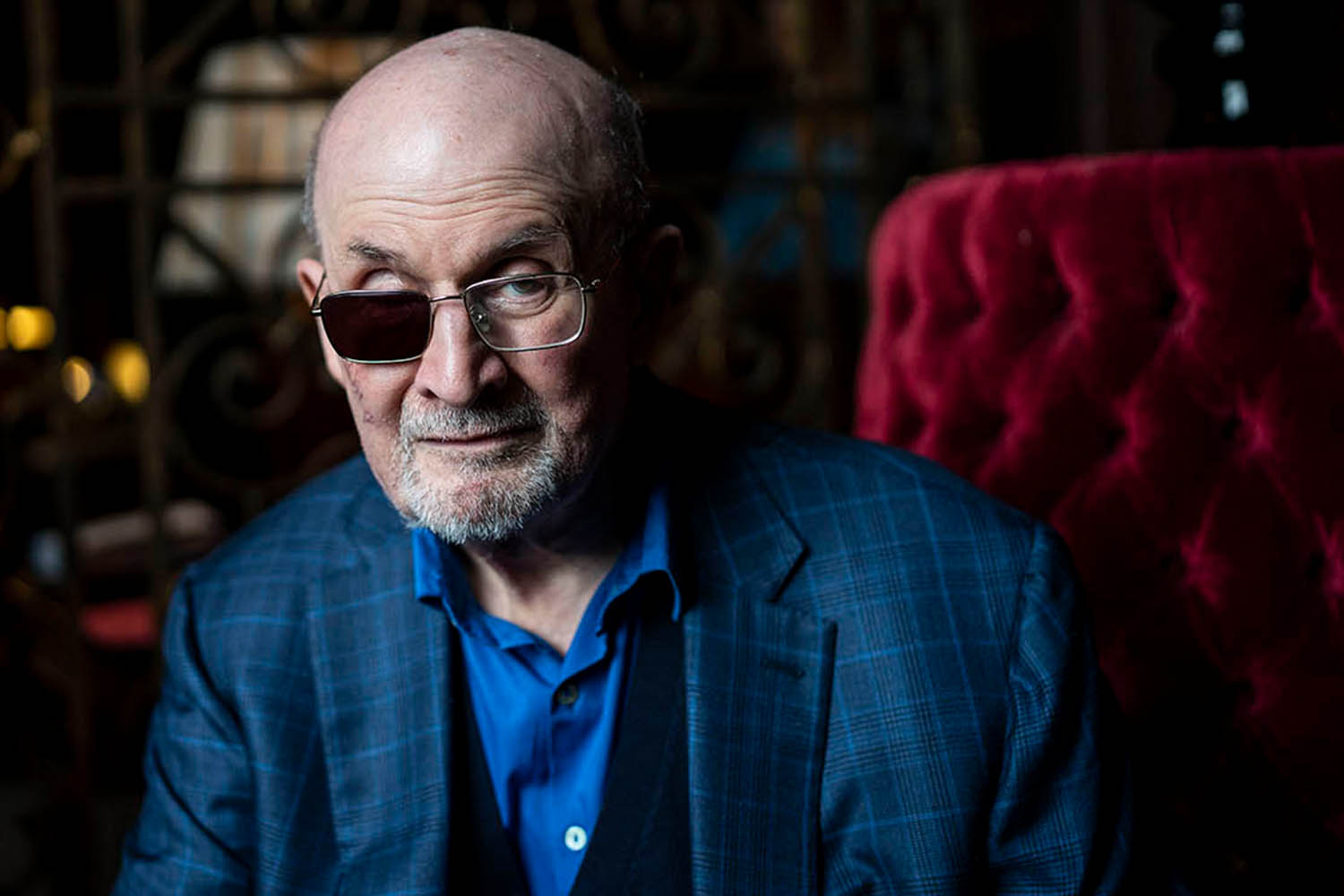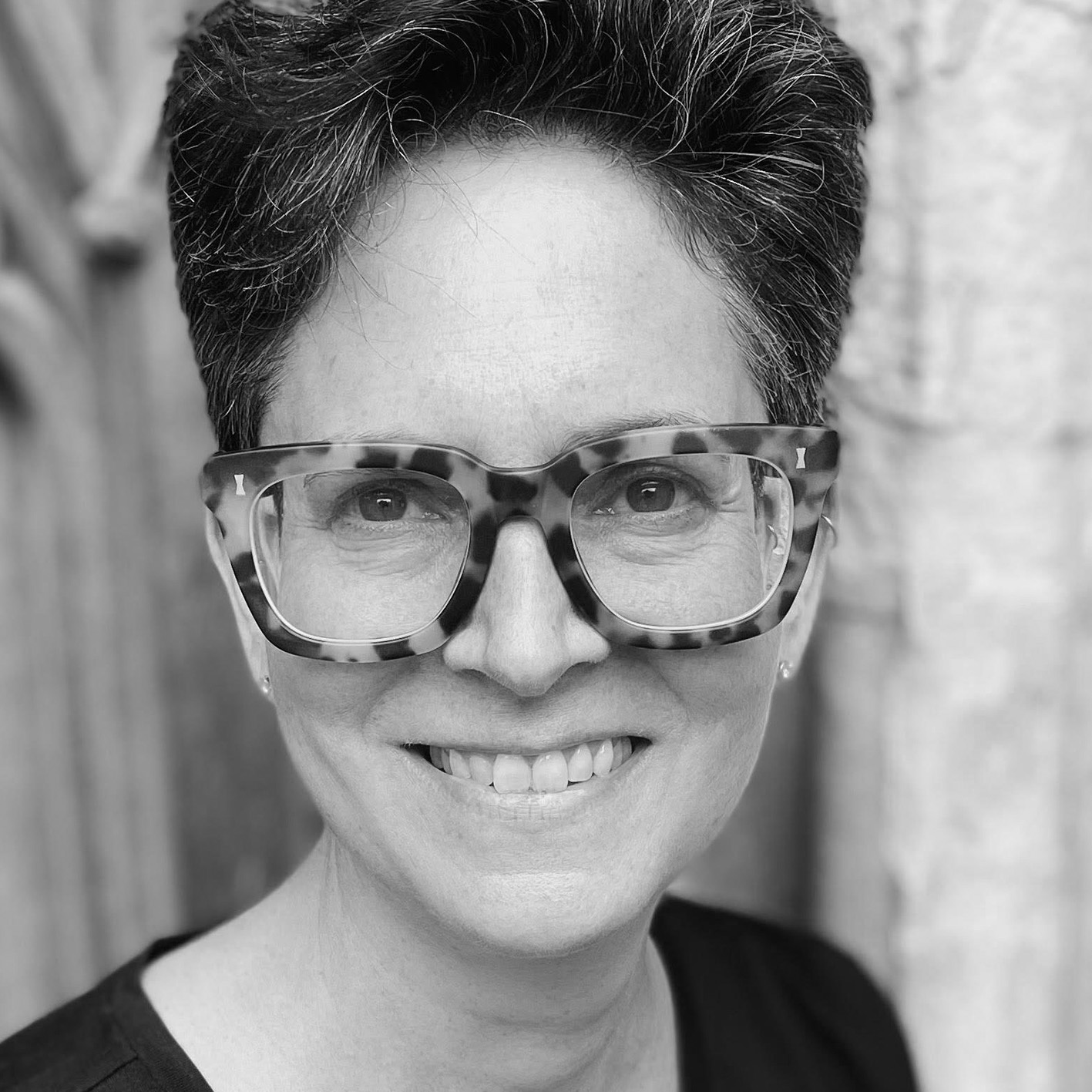There are a thousand people, give or take, in the biggest tent the Hay Festival has to offer, where Sir Salman Rushdie is closing out a dozen days of inspiration. When last year I helped to launch his memoir of his assault, Knife, at the Southbank in London, I was on stage but he was projected behind me on a giant video screen, streaming in from New York, where he has lived for the past 25 years. It was a strange break from what we’ve come to think of a kind of established double act, and yet how grateful I was he was still with us at all.
At Hay, the crowd roars its appreciation when he appears: it is worth remembering that it was not always so. In the aftermath of the fatwa declared against Rushdie and his publishers by Ayatollah Ruhollah Khomeini in 1989 – a fanatic response to his fourth novel, The Satanic Verses – there were those in the literary firmament (John le Carré, John Berger and Germaine Greer among them) who seemed to believe that he had only himself to blame; they have found themselves on the wrong side of history.
Rushdie was not daunted then and he is not daunted now. Along with his many other accomplishments and honours (the Booker of Bookers for Midnight’s Children, the knighthood, being made a Companion of Honour by Queen Elizabeth II, you know the drill) he is a distinguished journalist in residence at New York University; he teaches narrative non-fiction to graduate students. On stage at Hay, I ask him what he says to them about the issue of free speech. “I say I am in favour of it,” he answers drily. It’s his way to make a clear declarative statement and then elaborate with subtlety. I mention the case of Lucy Connolly, who was jailed for 31 months last year for sending a racist tweet in the aftermath of the Southport stabbings.
“Here in Britain, we have the Race Relations Act, which makes it against the law to make racist statements. In the United States, there is the power of the First Amendment, which is why American racists are able to openly say what they have to say, and they're not prosecuted. The question is: which do you prefer?”
He goes on to tell the story of a film made in Pakistan about the fatwa; the British Board of Film Classification didn’t want to give it a certificate, because it was concerned Rushdie would sue. So, he gave up his right to do that. “They gave it a certificate and it opened, up in Bradford. And nobody went to see it. Why? Lousy movie.” He laughs, and we all laugh too. It should also be recalled that Rushdie, for all the seriousness that surrounds him, is one of the funniest people I know. Not only are his novels rich with humour, but hey: he’s gone head-to-head with Larry David – let’s not forget Fatwa! The Musical, penned by Lin-Manuel Miranda, from Season 9 of Curb Your Enthusiasm – and come out even.
But he has a point to make. “I learned a lesson this way. Trust the audience to be able to make up their own minds. That is still my view. I think we are in a moment when people are a little bit too eager to prohibit speech they disapprove of. That’s a very slippery slope.”
However his life had gone, Rushdie would always have been a brilliant man, I have no doubt of that. But it is fair to say that he never expected to be a spokesman for anything, to have become, as he has, a kind of avatar for the principle he espouses and which very nearly cost him his life. Our topic at Hay is “the role of fiction in the world today” – and it is, finally, fiction that most concerns him. He has now published two memoirs: Joseph Anton (2012) a gripping account of the years following the ayatollah’s murderous decree, and Knife. But when he set out as a writer, “it never occurred to me that I could write about myself”, he says now. “That just seemed like the most uninteresting thing of all.”
As to the significance of fiction: “I think we live in a moment when people are in some way more seduced by true stories than made up stories,” Rushdie says, “as if made up stories are untrustworthy, unreliable. As if somebody’s not telling you the truth. But if you look at the history of literature, most of it is composed of fable and fantasy. Realism is a thing which was invented in the 19th century.”
“We now live in a moment when reality is extremely contested. One man’s real event is the other person’s fake news”
“We now live in a moment when reality is extremely contested. One man’s real event is the other person’s fake news”
But the events in the world around us seem so terrible, I say, from Gaza to Kashmir, from Sudan to Afghanistan, in too many places to name – how can fiction reckon with all this? “We now live in a moment when reality is extremely contested,” Rushdie says. “One man’s real event is the other person’s fake news. Take the Middle East. It’s very difficult for people to agree on what is the case. There are two very different descriptions of history and of what has happened. They are almost incompatible, these descriptions. Realism breaks down when there isn’t an agreement about the real itself. So, something that starts off by saying: let’s not even pretend there’s an agreement about the real, let’s use everything we’ve got to think about this, use all the tools in the basket; in a way that can feel, to my mind, more truthful, rather than less truthful.” There is a brief pause. Comedy is the most serious art of all. “But I’m biased, because it’s my job.”
It is impossible to not to be astonished by Rushdie’s valour and good humour. We enjoy a tasty, locally-sourced lunch in the green room before our conversation and then slip into another event at the festival: a talk between the novelist and artist Rachel Eliza Griffiths and the Columbian novelist Juan Gabriel Vásquez about Griffiths’s debut novel, Promise. Eliza, as she is known, is of course Rushdie’s wife, without whom, in his telling, he would never have survived his ordeal. Rushdie and I sit at the back of the tent: he is perfectly attentive, perfectly focused on her, his pride and love absolutely evident.
Newsletters
Choose the newsletters you want to receive
View more
For information about how The Observer protects your data, read our Privacy Policy

Then it’s time for Rushdie and me to slip out the back and head over to the Global Stage – a journey of just a few hundred yards, but we make it in the four-and-a-half-ton bullet-proof car he has come in. Don’t roll down the windows. Don’t open the doors yourself. There is security ahead and behind, gracious and implacable. The novelist’s observing eye is something I’m accustomed to being around; it’s my eye too, after all, the way I see the world, through the open lens that seeks narrative everywhere. But this is something else entirely: to watch the pair who keep watch over my friend is to understand the burden of such protection.
I think back to the drink I had with Rushdie just a few days before he was attacked in Chautauqua; I was introducing him to a New York friend because they belonged to the same downtown club. My pal asked Rushdie what his life was like now; “perfectly ordinary”, Rushdie said. The bad old days were over. In the green room Rushdie says to me that when his attacker — whom the author does not like to name — lunged for him, he thought simply, “Now? Now?”
When I ask him how he is these days, he shrugs. “This is as good as it gets,” he says with a smile. In truth, his survival, his thriving, is a kind of miracle. Rushdie writes about the miraculous but does not himself believe in it, which is curious to ponder, as he himself has said. “I’m annoyed about not having a right eye,” he says plainly; he has asked to sit to my right so he can see me more easily as we speak. “But on the whole, I’ve been very fortunate, and I’m in better shape than maybe I would have expected.” What is clear is how keen he is to put the past behind him: when the new book comes out, “it will be very nice to have fiction to talk about again, because ever since the attack, really the only thing anyone has talked to me about is the attack.” His feelings are plain. “I’m over it.”
A few weeks before we speak, his attacker received the maximum sentence – 25 years for attempted murder – for the brutal assault. Does this bring “closure”, which is the sort of thing we read about in novels?
“The sentence really didn’t bring closure, no,” he says. “Though I was pleased he got the maximum sentence. The closure came more from finishing Knife.” And he speaks of returning to the Chautauqua Institution, where the attack took place on August 12, 2022. “My wife Eliza and I went back to revisit, as it were, the scene of the crime; that was an important moment to show myself that I was standing up where I fell down.” It only strikes me later that many of us might talk about revisiting, “as it were”, “the scene of the crime”; never do we mean it literally as Rushdie does.
He feared the stories, the fountain of his fiction, might not flow again; it is presumptuous of me, but I was not surprised when I heard he would have a new book of short stories out in the autumn. In so many of his novels there is a storyteller who frames the tale, just as there is in his beloved Arabian Nights, in the Indian legends and fables he was raised on. A true storyteller can never be silenced. There were a few quiet months between the completion of Knife and its publication. “Anyone who knows me knows that I hate it when I don’t have anything to write! I’m much nicer when I have something to write,” he says. “I wanted to write a story inspired by my having been at Cambridge a hundred years ago.” He took his undergraduate degree there, graduating in 1968. “One of my great good fortunes was to have been at King’s College at the same time as EM Forster: I was 19 and he was nearly 90. We only met a couple of times, but it has always stayed with me as a very precious memory.”
“If there's a moment when there’s a funny book written by AI – then I think we’re screwed”
“If there's a moment when there’s a funny book written by AI – then I think we’re screwed”
But the story, as Rushdie has discovered over and over again, is only partly in the control of its teller. “I sat down to write – but he died in the first sentence. And so I wrote a ghost story – and that was my way back.”
Not bad, in your mid-seventies, having survived an attempt to murder you, to write your first ghost story, to keep experimenting and making what is new. Certainly, we might say that Rushdie has a style in his fiction (“I’ve always been attracted to too-muchness” is one way he describes it), and that there are themes he will return to: perhaps most notably how human beings hope for the best and accomplish the worst. But he is always pushing himself forward, working towards discovery, and I don’t see him stopping any time soon. As to the threat AI poses to artists, he’s not worried – so far. He once saw 100 words of an AI text written “in the style of Salman Rushdie”: “it was terrible, just terrible”, he says. “For one thing, it has no sense of humour. The machine can absorb a million jokes, but it can't make one up, because you only get a version of the million old jokes. Unfortunately, however, this thing learns very fast. If there's a moment when there’s a funny book written by AI – then I think we’re screwed.”
His optimism – personal, political – is not naïve, but springs from both spirit and study. Sure, he’s as gloomy as any of us about “the orange moment that we live in”, he says, refusing to name Donald Trump as he refuses to name his assailant, but he believes there is always reason to hope. “We can say that things change,” he offers. “Before I was a novelist, I was a student of history. That’s my degree – history. One of the things that the study of history teaches us is that history does not run on tramlines. It’s not inevitable. There’s a wonderful collection of stories by Grace Paley, Enormous Changes at the Last Minute – I think history is like that,” he says. He points out that if he and I had been sitting on stage together in 1989, and he had predicted the imminent fall of the Soviet Union, I might have felt I had cause to doubt his sanity. And then he gives a little sigh. “I do know that someone’s trying to rebuild it,” he says.
At the end of our conversation the crowd in the darkened hall rises to its feet. Offstage, we embrace, before he’s whisked off to sign books. He won’t sit in the open shop to greet the thousand people queuing to meet him; a little area is cordoned off so a security check can be done on each eager reader seeking a signature. You don’t have to spend much time with Rushdie to know he’s an extrovert, someone who thrives in company. The guarded world he inhabits, has re-inhabited now, is a high price to pay; yet he’s paid much higher.
The road ahead is long, I find myself thinking when we’re done. The hill is steep. All we can do is look for companions who inspire us and give us courage, who keep us on the path, who tell us stories to pass the time. Salman Rushdie is the best and bravest of companions – for all of us.
Order Knife(Vintage Publishing, £10.99) and The Eleventh Hour (Vintage Publishing, £18.99) by Salman Rushdie at observershop.co.uk to receive a special 20% launch offer. Delivery charges may apply.
Photographs by David Levenson & Matthew Horwood/Getty Images

